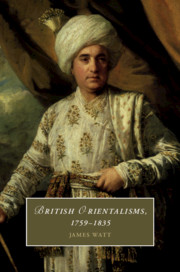Book contents
- British Orientalisms, 1759–1835
- Cambridge Studies in Romanticism
- British Orientalisms, 1759–1835
- Copyright page
- Contents
- Acknowledgements
- Introduction
- Chapter 1 ‘Those Islanders’
- Chapter 2 ‘Indian Details’
- Chapter 3 ‘All Asia Is Covered in Prisons’
- Chapter 4 ‘In Love with the Gopia’
- Chapter 5 ‘Imperial Dotage’ and Poetic Ornament in Romantic Orientalist Verse Narrative
- Chapter 6 Cockney Translation
- Chapter 7 ‘It Is Otherwise in Asia’
- Conclusion
- Bibliography
- Index
- Cambridge Studies in Romanticism
Introduction
Britain, Empire, and ‘Openness’ to the East
Published online by Cambridge University Press: 31 July 2019
- British Orientalisms, 1759–1835
- Cambridge Studies in Romanticism
- British Orientalisms, 1759–1835
- Copyright page
- Contents
- Acknowledgements
- Introduction
- Chapter 1 ‘Those Islanders’
- Chapter 2 ‘Indian Details’
- Chapter 3 ‘All Asia Is Covered in Prisons’
- Chapter 4 ‘In Love with the Gopia’
- Chapter 5 ‘Imperial Dotage’ and Poetic Ornament in Romantic Orientalist Verse Narrative
- Chapter 6 Cockney Translation
- Chapter 7 ‘It Is Otherwise in Asia’
- Conclusion
- Bibliography
- Index
- Cambridge Studies in Romanticism
Summary
In 1761 Richard Owen Cambridge published An Account of the War in India, telling the story of a decade of conflict between British and French forces in the south of the subcontinent. While this work says nothing about the 1757 battle of Plassey and the subsequent revolution that led to the East India Company (hereafter EIC) gaining sovereign power in Bengal, it testifies to ‘the great reputation which the nation, and so many individuals have acquired in the East-Indies’. Cambridge suggested that those, like him, without first-hand experience of India might already be primed to receive news of Britons’ fantastic exploits there because of the ‘Eastern’ fictions to which they were accustomed: ‘It will not appear strange that the generality of the world, through the habits of reading novels, and works of the imagination, should expect from an history of the East (… the scene of most of their ideal stories) a tale of adventures full of wonder and novelty, and nearly bordering upon romance.’ Even as he recorded the improbable story of how ‘a handful of Europeans’ had been able to dominate ‘a multitude of Asiatics’, however, Cambridge emphasized that his own narrative was soberly factual. He also sought to mediate what he presented as – for himself and his audience – a hitherto unknown reality, prefacing his text with a ‘Glossary of Persic and Indian Names’, from ‘Arzee’ (‘a request, or petition’) to ‘Vakeel’ (‘an agent or minister for the Moors’). Cambridge therefore identified two different and apparently opposing registers of representation in and through which ‘the East’ might be apprehended by Britons – the fictional extravagance of ‘ideal stories’ and a new lexicon of more precise and detailed reference that was the product of an ongoing global conflict.
- Type
- Chapter
- Information
- British Orientalisms, 1759–1835 , pp. 1 - 22Publisher: Cambridge University PressPrint publication year: 2019



